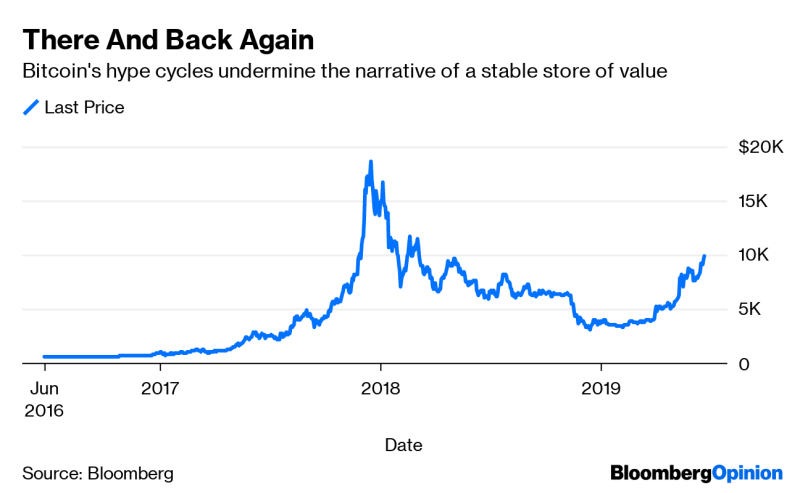

(Bloomberg Opinion) — Apparently, Mark Zuckerberg has helped Bitcoin to surge past $10,000 again, a price it first surpassed in 2017 as part of an epic speculative bubble that popped not long after.
Last week, the Facebook Inc. co-founder unveiled his social network’s cryptocurrency, Libra, a corporate version of Bitcoin that embraces regulation and is backed by fiat money like dollars or euros. (Bitcoin doesn’t and isn’t.)
No matter the glaring differences between the two digital tokens, the symbolic coming-together of Zuckerberg and the Winklevoss twins – whose post-Facebook career has been all about dragging Bitcoin into the daylight of mainstream finance – has created a narrative where crypto has “made it.” If Zuckerberg is praising it, not burying it, this thing must be real.
For those who have lived through three hype cycles in the space of five years, though, it is hard to put faith in the idea that the price of Bitcoin – which is up 100% since April, up 200% since February, yet still 50% down from December 2017 – reflects any intrinsic value better than one or two years ago. Much like the last time the currency hit $10,000, there is nothing stopping it from rocketing higher before crashing.
What has changed since 2017? Much about the market is still murky, and regulators are probing potential price manipulation amid concern that a large proportion of reported trading volumes are fake or exaggerated. Tokens like Tether, which plays a big role in spurring Bitcoin trading, are firmly in investigators’ cross-hairs.
For those who support Bitcoin as a peer-to-peer payment mechanism that cuts out banks, there’s not much to cheer either. The virtual currency is still slow, cumbersome and costly. It processes about five transactions per second, versus about 1,700 on the Visa network. In times of high demand, the capacity problem becomes glaring; in April, transaction fees rose some 200 percent. Fixes like increasing the block size and off-chain transactions have only helped a bit.
Nor is Bitcoin any more useful for retailers. The price volatility and high fees were already a turn-off for those dabbling in 2017. Two years later, companies that are testing crypto, like AT&T Inc., still prefer not to handle Bitcoin itself but to use a third party to convert it into dollars.
Thus follows the “digital gold” argument – or, Bitcoin is so bad at payments it should only be HODL’d. Supposedly, every millennial needs crypto as a hedge against inflation and geopolitical risk: Central banks are keeping interest rates low, war in the Middle East is a rising possibility, and the EU is set to lose one of its biggest members.
But that line of reasoning requires people to believe in Bitcoin as a store of value – a stretch for most – and for its price to reflect that. The currency’s three-year price chart offers little comfort.
What’s left is exactly what’s always been there: A token whose price goes through the roof during times of exuberance because of artificially imposed scarcity. Bitcoin’s rules dictate there will only be 21 million of them, and the difficulty and rewards of mining new ones adjust along the way. Provided people always want some, and believe they are worth more than the Pokemon cards under the bed, the potential for price swings is unlimited. It’s a speculator’s paradise.
Rather than blame Zuckerberg, we need to grapple with the real-world problems that fuel people’s desire for a golden ticket. For many millennials, saving money earns no interest, retirement looks to be a dream, and owning a house is beyond reach. That’s what allows people like Bitcoin icon Charlie Shrem to tweet: “5 BTC is all you need, HODL for 15-20 years and you’ll never need to work again.”
Why blame Zuckerberg? Blame Satoshi, Bitcoin’s creator, or policymakers who haven’t worked out how to control speculative asset bubbles anywhere, let alone crypto’s. For once, Facebook isn’t the bad guy.
To contact the author of this story: Lionel Laurent at [email protected]
To contact the editor responsible for this story: Edward Evans at [email protected]
This column does not necessarily reflect the opinion of the editorial board or Bloomberg LP and its owners.
Lionel Laurent is a Bloomberg Opinion columnist covering Brussels. He previously worked at Reuters and Forbes.
<p class="canvas-atom canvas-text Mb(1.0em) Mb(0)–sm Mt(0.8em)–sm" type="text" content="For more articles like this, please visit us at bloomberg.com/opinion” data-reactid=”38″>For more articles like this, please visit us at bloomberg.com/opinion
©2019 Bloomberg L.P.








